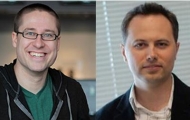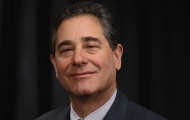E-Newsletters: Fall 2017
FALL 2017 - THE CELEBRATIONS & ACCOLADES EDITION
Pomp & Circumstance
Biostatistics is turning 100!

ON JULY 29, 2017 THE DEPARTMENT OF BIOSTATISTICS GOT A JUMPSTART TO ITS CENTENNIAL YEAR IN GRAND FASHION!
The date was July 29, 2017 and the Department of Biostatistics got a jumpstart to its centennial year – which will officially be celebrated in 2018 – in grand fashion! Current faculty, students, postdoctoral fellows and staff were joined by alumni that spanned nearly 40 years for a day-long celebration that won’t soon be forgotten.
The day’s festivities commenced with a symposium that offered a range of perspectives from both current and former faculty and students, which truly expressed the magnitude of the occasion. Approximately 150 guests participated in a total of six sessions, the first of which was a poster presentation that included photos from the department’s humble beginnings to highlights in current research; three forward-looking panels: “Biostatistics research impacting the future and increasing the impact of Hopkins Biostatistics,” “Key problems and questions in Biostatistics for the next 100 years” and “Creating, maintaining and enlarging the Hopkins Biostatistics family”; the premiere of a mini documentary created in honor of the Department’s 100th birthday; and last, but not least, an informal gathering to get the party started for the merriment to come later that evening (no one can ever say that biostatisticians don’t know how to party!).
Guests took a break to change into their best and grab their dates for a black tie optional affair held at Montgomery Park – the former Montgomery Ward distribution center turned office space and event venue in Baltimore’s Pigtown. During cocktail hour, guests caught up with former cohort members, sampled hors d’oeuvres and smiled for the camera in front of a life-sized “100” marquee. Dinner was enjoyed and the night was capped off with dessert and dancing – the highlight of which was Department Chair, Karen Bandeen-Roche, ceremonially cutting a towering replica of the Kaplan-Meier curve encircled by an abstract impression of Lowell Reed’s “wedge.”
The Department is immeasurably grateful for the contributions each of its members has given over the years and it is our plan to continue to drive health through data for years to come!
Check out the full gallery of photos from the centennial soiree here!
Star Power
Department Chair Awarded $11M NIA Grant

HURLEY-DORRIER PROFESSOR AND CHAIR OF BIOSTATISTICS AND ICTR DEPUTY DIRECTOR, KAREN BANDEEN-ROCHE, AWARDED NATIONAL INSTITUTE ON AGING (NIA) GRANT
Karen Bandeen-Roche, professor in Biostatistics and Geriatrics, Ravi Varadhan, associate professor in Oncology and Biostatistics, and Jeremy Walston, professor in Geriatrics, were recently awarded a U2U3 grant mechanism sponsored by the National Institute on Aging (NIA) for their clinical research project entitled “Characterizing Resiliencies to Physical Stressors in Older Adults: A Dynamical Physiological Systems Approach.” This award totals $11,560,771 over five years and is focused on the identification of physiological and molecular signatures of resiliency in older adults undergoing stressful procedures.
The immediate goal of the study is to identify specific systems involved in the maintenance of resiliency in older adults, and measure specific markers of these, such that persons vulnerable to adverse impacts after procedural stressors can be identified. This will include novel measurements of dynamic physiological and molecular systems’ response to hip replacement surgery, hemodialysis initiation and bone marrow transplantation and the ultimate impact of these systems on outcomes. The long term goal of this study is to identify and assess the systems that most impact the health and well-being of older adults during and after stressful events, and to use a resulting resiliency signature to develop interventions that improve immediate and long term outcomes in older adults undergoing surgical or medical procedures.
Biostatistics will play a large role in this project: Its expertise will underlie the development of resiliency assessments and the development and models and methods to estimate the dynamical systems states and responses. A broad network of nearly 30 clinical and research-focused collaborators on the Bayview and East Baltimore medical campuses will work together on this exciting effort.
Accolades
Junior Faculty Score Two Big Wins

JEFF LEEK AND VADIM ZIPUNNIKOV ARE TWO OF 34 RECIPIENTS OF THE JHU CATALYST AWARD, UNIVERSITY-WIDE, AN HONOR THAT IS ACCOMPANIED BY A $75,000 GRANT, MENTORING OPPORTUNITIES, AND INSTITUTIONAL RECOGNITION.
JEFF LEEK WON THE CATALYST AWARD FOR HIS GRANT ENTITLED: "THE NEW BLUE COLLAR - REMOTE DATA SCIENCE JOBS FOR IMPROVING ECONOMIC SECURITY AND HEALTH."
The research focuses on retraining people from industries with significant job losses to more modern industries. There are two major potential issues with many job retraining programs: (a) most retraining programs are too expensive for unemployed individuals and (b) the cost of living where tech jobs are is extremely high.
In this proposal we aim to build the beginning of a pilot program to generate an entirely new class of remote blue collar jobs and evaluate the impact of this program on a panel of economic and health outcomes. Our proposal has four components: an ultra-low cost training program to teach data cleaning and management, establishing an independent hiring entity to employ the graduates of the training, creating a market for remote workers hired through the independent hiring entity and a study of the economic and health outcomes out of the program.
The basic theory behind our approach is two-fold. First is that most educational programs - particularly technical education programs - are too expensive for those who are unemployed or transitioning from traditional blue collar jobs. Second is that the traditional hubs of tech jobs (San Francisco, New York City, Seattle, etc.) are prohibitively expensive to move to if you are currently unemployed or in a career transition. Jeff proposes to study how creating remote data work can help address these challenges.
VADIM ZIPUNNIKOV WON THE CATALYST AWARD FOR HIS PROPOSAL ENTITLED: "STATISTICAL METHODS FOR DEVELOPING COMPLEX CROSS-SYSTEMS BIOMARKERS FROM MULTI-MODAL WEARABLE DATA."
His proposal develops methods for data simultaneously collected by multiple wearables (such as fitness and sleep trackers, heart rate monitors, GPS) and electronic diaries also known as ecological momentary assessment (EMA), burst measurements, intensive longitudinal data, experience sampling data. Daily electronic diaries available through smart-phones/watches are now extensively used for ecological momentary sampling that taps patterns of many homeostatic systems including sleep, emotional states, dietary intake and others to assess behavioral components of human homeostatic systems. His proposal focuses on the understanding the complex interaction of multiple of sleep, physical activity, and circadian biomarkers coupled with the context from electronic diaries to characterize multi-modal behavioral phenotypes. The methods developed as part of this proposal will provide a deeper understanding of the dynamic interplay of multiple brain-body systems and will facilitate the development of personalized in-time prevention strategies.
Career Spotlight
After 15 years of service, Tom Louis retires

DECORATED PROFESSOR, TOM LOUIS, SHARES SOME OF HIS FONDEST MEMORIES DURING HIS 15-YEAR TENURE WITH THE DEPARTMENT.
My contact with Hopkins Biostatistics started in the 1980s, when Scott and I walked and talked at statistical meetings. It continued through the 90s, with the department’s 75th anniversary and a subsequent seminar. I arrived for real in 2002, and the past 15 years have been completely gratifying in research, education, professional service, and collegial participation with the department and school.
A sample of research projects includes correlates of student success in grade and middle school; genomics; risk assessment; infectious disease modeling; randomized trials in obesity reduction, treating eye disease and lung disease; small area estimates of birth control use in Africa; and the epidemiology, control of malaria in sub-Saharan Africa; Bayesian methods for sub-group analysis. These and other projects have addressed important public health issues, fostered collaboration with world-class investigators and work with excellent students.
I’ve enjoyed teaching across the spectrum: introductory, masters and doctoral-level statistical methods, hierarchical models, advanced probability, survey methods, and clinical investigation. Service as primary advisor and committee member for masters and doctoral students in Biostatistics, other SPH, and Medical School departments generated bi-directional education.
From 2013-2015 I served as Associate Director for Research and Methodology at the Census Bureau, an opportunity that increased my understanding of the federal statistical principles and practices, highlighted the importance of design-respecting analyses, and that we need to increase attention to sampling in our curriculum.
Hopkins employment helped create opportunities for external and internal service, including presidency of the International Biometric Society, editorship of two statistical journals, service on National Academies committees and on the NIEHS Board of Scientific Counselors. Service on school-wide committees (Appointments & Promotions, Academic Standards, Faculty Senate (including president), enriched my Hopkins experience, gave me the opportunity to work with faculty across the school, and gave me the chance to have positive impact on school-level issues. Through service on the HopkinsOne University-wide Faculty Advisory Committee, I helped “make the financial streets safe” for employees and students.
Enough cataloguing—my vita tells (almost) all. Faculty, students and staff in Biostatistics and the entire school have been welcoming, and unselfishly willing to help with grants, courses, pretty much anything. Our daily, drop-in lunches with high-level discussions (actually, mostly gossip!), is a wonderful departmental habit, as is our “if in doubt, have a food event” rule of engagement. These and other activities ensured that my time at Hopkins was far more than academic.
I’ve served as faculty at Boston U, Harvard, Minnesota, and Hopkins, with stints at RAND and the Census Bureau. Each has been fulfilling, but, without question, Hopkins Biostatistics and the entire SPH are the crème de la crème in research, education and social culture. As of January 2018, I’ll be emeritus, but I’ll continue with a few Hopkins projects, and also work with the FDA to activate Bayesian methods in pharmaceutical and biologics trials. On the personal front, more time with geographically dispersed children and grandchildren, more time with Germaine, and re-engaging in a few hobbies left behind long ago, round out my semi-retirement portfolio.
